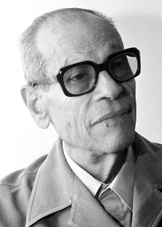 |
| Naguib Mahfouz (nobelprize.org) |
“Events at home, at work, in the street- these are bases of a story.” In 1936 a man with a talent and many dreams embarked on a mission. Naguib Mahfouz is one of the most renowned figures in Arab literature and known as the first Arab contemporary author.
Naguib Mahfouz was born in 1911, into a middle class Egyptian family in Al Gamalleya, (at the time a new suburb of Cairo). His neighborhood would later become a major setting of his novels.
At first Mahouz flourished in his career as a civil servant and minister. After his retirement from government in 1936 Naguib Mahfouz decided to take on writing. His goal was to complete a series of novels that encompassed historical aspects of a great city along with stories that coexisted within the history. The novels also focused on the old parts of Cairo with many of the books named after the different streets throughout, collectively known as the Cairo Trilogy. Naguib Mahfouz grew up at a critical time in Egyptian history. It was right after the 1919 revolution and Egypt had just gained independence from the British and was establishing itself as an independent nation. The time period really had an effect on his writing and was a part of his inspiration. After Mahfouz completed the third volume of his 30 unfulfilled novels of Egyptian history, he began to lose interest in the topic and was more enlightened by the writing of psychological and social change on ordinary people. His books explained the ways of exclusive groups and people in Egyptian Society as well.
Mahfouz’s work was often cited as critical and he himself was very critical about many parts of Egypt, especially politics and Islamic fundamentalism that at the time were shaping the nation. He was quite opposed to Islamic fundamentalism as he believed that anybody should be able to do what they want and say what they want, this is supposedly a right of the Egyptian citizens, but is not necessarily given by the government. He fought hard and always expressed his true opinions. He was the type of person who would stand up for what he thought was right even if he was standing alone, a truly authentic person. He was also critical. He was largely in favor of President Sadat’s peace treaty with Israel, which was a brave and bold move on Sadat’s side. Whilst working with the government as a minister Mahfouz had been evicted from his role as Minister of Religious Affairs to a more suitable position as Minister of Cultural Affairs due to the fact that he was an atheist. Being an atheist was not tolerated in Egypt and the rest of the Middle East as it still is true today. As a result he was on the death list of several Islamic fundamentalist groups and was in constant threat of an assassination.
Mahfouz’s work told the story of Egypt. Although banned in many countries until a certain point, due to extreme controversial remarks, of which many tell the true states of the Middle East, his work has been recognized throughout the world. In fact Mahfouz’s work was so successful that he won perhaps the most honorable recognition known today, the Nobel Prize in Literature. Anywhere around the world Mahfouz could be referred to as one of the most well known Arab figures to walk the face of this planet. Despite of a ban on his work throughout the Middle East, Mahfouz is still one of the most influential Arab authors.
UMahfouz died in hospital in 2006 due to a fall. However, his work will live on in many forms that will be a source of pleasure and learning. This righteous man lived a life where he gave everything he possibly could, everything that will contribute to future generations to come. “At home, at work, in the street- these are bases of a story.”
Page created on 7/10/2015 11:25:22 PM
Last edited 10/27/2024 4:23:20 PM
